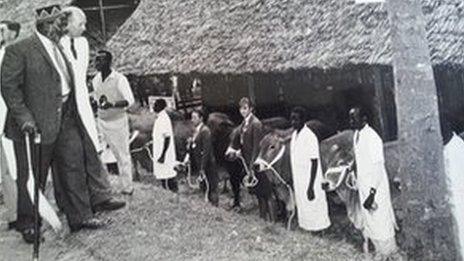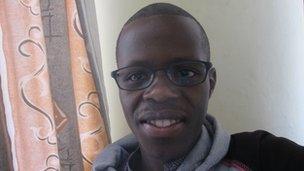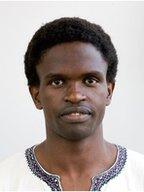Kenya's Mau Mau revolt: Your experiences
- Published
Foreign Secretary William Hague has expressed regret and announced compensation for Kenyans tortured during the Mau Mau uprising in the 1950s and 60s.
Thousands of people were killed during the Mau Mau revolt against British rule in Kenya.
BBC News website readers explain how the Mau Mau uprising affected their lives and share with us their feelings on William Hague's announcement.
The following accounts contain descriptions of sexual violence and torture.
Michael Blasdale, Norwich, UK

Michael Blasdale and Jomo Kenyatta at a farm in Kenya in the 1960s
I used to meet the current President Kenyatta's father, Jomo Kenyatta, a lot, when I lived in Kenya. He met me at some of the farms I worked at.
I worked in the veterinary department in Kenya from 1952 until 1965. I got paid £550 a year when I first started.
We always had a great relationship with the local Africans. We all had to speak fluent Swahili and we all respected each other.
Some tribes were delightful, some were awful. The Maasai used to mix blood from cattle and milk together to drink it. That was what they did.
But please remember we saw many, many atrocities committed by the Mau Mau; whole white families raped and murdered.
We went to Kenya to help them by inoculating their cattle, by putting in cattle-dipping schemes to prevent their cattle dying from tick-borne diseases.
The local Kikuyu were quite delightful, bringing presents when our children were born. But unfortunately the Mau Mau were barbarous, killing white and black people with abandon.
And what about the Lari massacre when the Mau Mau went on the rampage killing hundreds of Kikuyu women. And what about Leakey being buried alive?
Yes, there were wrongs and rights and I cannot speak for the British Army. It is still a great country and I have visited it five or six times since I left.
Robert, County Durham, UK
It seems to be okay for the government to pay compensation to the Kenyans due to the Mau Mau uprising - but what about the English colonials!
I was born in Nairobi in 1948 as my father was stationed there just after the war. I moved back to the UK when I was six years old.
My mother told me of many atrocities that both she and my father endured whilst living in Kenya.
The natives put razor blades around the mosquito nettings so that when their hands touched them they were so often cut.
Also the natives placed poisonous snakes during the night to purposely attack anyone sleeping in the house.
My mother told me we had four or five Staffordshire terriers protecting the house, they were bludgeoned to death.
I lost my mother three years ago, she would be rolling in her grave at hearing the news today.
So why is the government not supporting the white community that survived these terrible actions by the so-called persecuted native Mau Mau.
I feel that my parents have been let down very badly by the government and that they should hang their heads in shame.
I want compensation for the abuse that my parents endured. Pay up or else feel the shame that you deserve.
Elisha Ratemo, Nairobi, Kenya

Elisha Ratemo would like an apology to all Kenyans
[It] is a joke. The years it has taken the victims to seek recognition should have been factored in.
The British government should apologise to all Kenyans and not just to the identified Mau Mau victims.
Paying the elderly victims about £3,000 is not justifiable in regard to what they have undergone. We need to hear Foreign Secretary William Hague announce a package that will see considerable if not proper justice to the victims and their kins who even now remain affected.
What we need is proper justice for the victims, not only the Kenyan Mau Mau but largely all those who suffered under the appalling abuses of British Imperialism.
Gerald Mwangi, Belfast, UK

Gerald Mwangi's family suffered a lot of pain
My grandfather together with others suffered pain and harassment under our colonial masters.
I come from Murang'a, central Kenya, where the Mau Mau movement had very strong roots. My house is located near Mukurwe-ini wa Nyagathanga where the Kikuyus are known to have first settled on arrival to East Africa.
The close proximity to this location meant that my grandparents, as well as other members of the community, were privy to in-house discussions of the Mau Mau movement going on during the war.
My father, barely eight years of age at the time of the conflict, would recall how his family of nine would often be moved from one place to another by the colonial government as they attempted to limit the contact between the Mau Mau and the rest of the population.
Tears would run down the face of my white-bearded grandfather as he recounted his personal experiences with the colonial government. They were taken from one detention camp to another and their families would take ages to know where they were.
What happened in those concentration camps, as he would always narrate, was beyond belief! Men would be ordered to strip and their private parts would receive a thorough beating. He watched as people died in those camps and those that came back would tell of atrocities committed by the government of the day that were too graphic for my young mind.
Women who were suspected to have been wives of the Mau Mau bore the brunt of it all. The colonial interrogators would shove bottles into their private parts to ensure they gave up every bit of information about their husbands.
Listening to the stories of the Mau Mau victims and the suffering on the hands of the British government and their desire to sincerely forgive and move on is just incredible. These old, frail and probably near-death-bed Kenyan heroes and heroines are asking two things; acknowledgement and sincere apologies from the British government that evil was committed against them and secondly a good compensation that would give them a decent short life remaining for them.
The idea that the British Government will be spending within the range of £20m for the compensation of the Mau Mau victims should leave us all worried. It is true that no money can buy back a life lost but to think that these freedom fighters who had a just cause are worth that much is just laughable!
Robin Williams, Colchester, UK
Will British people be able to claim compensation from the Mau Mau (or Kenyan government) for atrocities committed by them?
There were many and my father was one of the victims.
Any British atrocities were in retaliation, not that this excuses them, and compensation should work both ways.
In the mid-1950s, my father was headmaster of a grammar school in up-country Kenya, a Mau Mau stronghold.
My mother did not want to live there, due to the danger, so she and I remained in England. My father returned on leave in 1955 and I overheard, and was party to, many stories about the atrocities committed by the Mau Mau.
As a gift for me he brought a machete taken from the Mau Mau, about 24 inches long, that had been forged locally from a plough blade that still had the maker's Sheffield Steel stamp on it.
This weapon was quite capable of beheading someone. It was far too dangerous to be left with a 10-year-old boy so was taken from me until "I was old enough to have it". I never saw it again.
Eventually, the situation got so bad that the school was closed and my father lost his job.
There were many atrocities committed by the Mau Mau, mainly but not exclusively against other natives (many of the whites in the colony at that time considered themselves Kenyans). It seems that the colonists retaliated in kind making both sides guilty, and any compensation should be available to both parties, from both governments.
My personal opinion is that this was a civil war that took place over half a century ago so nearly all of the criminals and victims are deceased, and it is best to learn what lessons we can from it and move on.
More comments
This is certainly not enough. I will never forget the pain in my grandfather's voice, the anger on his face every time he spoke about the the freedom struggle. He told of the anxiety they went through in detention, how he had to leave my dad, then just in his teens in charge of his mother and stepmother and other siblings. Young souls left without a fatherly figure for many years. I will never forget how he spoke about the construction of the airport, how they were forced to carry sand on their heads. I will never forget the tears in his eyes when he talked about how women had boiled hot eggs and bottles inserted into their genitalia. My grandfather has long gone to be with our maker, but he passed on an angry man. Ndung'u Ndegwa, Nairobi, Kenya
The Mau Mau regime was running when I arrived in 1944, with my parents. Jomo Kenyatta and his merry men were playing hide and seek. The men hid behind the sheltered curtain of a few hand-picked Asian families they trusted! My uncle Madhavan and my parents hid them! In 1948, I remember it as if it happened yesterday. I had just turned 10. I can proudly say that my parents felt they should help the Kikuyu tribesmen and the Mukkamba tribesmen who were the intellect at that time. What compensation do you think will compensate the wounded for the mental torture they went through? Thayil K Nair, Blackburn, UK
I sincerely hope that the compensation paid to the ex-Mau Mau freedom fighters will be shared out among the survivors of The Lari massacre. I think those who survived the burning alive of their families would be grateful to receive some kind of recompense for their suffering at the hands of the Mau Mau freedom fighters. I served in Kenya with the British army 65th Independent Infantry Brigade. Peter Jackson, Southport, Australia
Interviews by Victoria Park
- Published6 June 2013